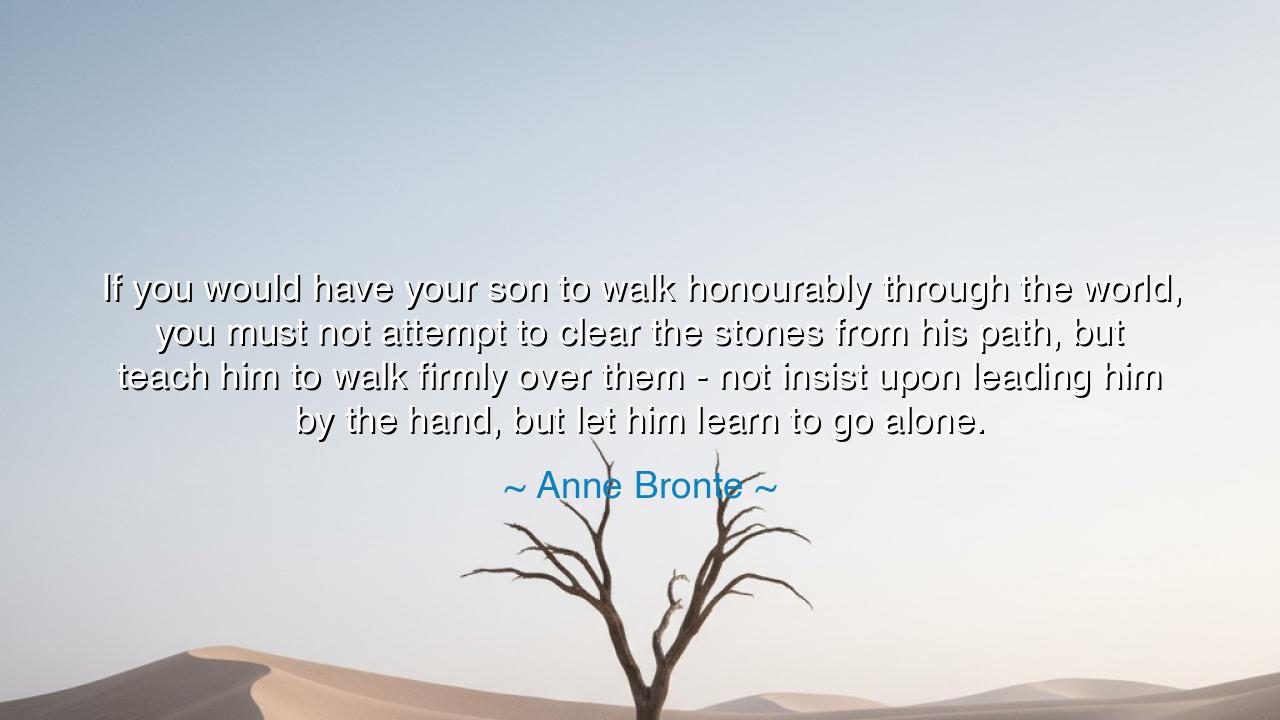
If you would have your son to walk honourably through the world
If you would have your son to walk honourably through the world, you must not attempt to clear the stones from his path, but teach him to walk firmly over them - not insist upon leading him by the hand, but let him learn to go alone.






“If you would have your son to walk honourably through the world, you must not attempt to clear the stones from his path, but teach him to walk firmly over them — not insist upon leading him by the hand, but let him learn to go alone.” — Anne Brontë
In these words, Anne Brontë, the quietest yet most steadfast of the Brontë sisters, speaks a truth as ancient as time and as enduring as love itself. Her counsel flows not merely from maternal tenderness, but from wisdom wrought in hardship — that strength is not given, but earned, and that true love is not the removal of struggle, but the shaping of courage. To “walk honourably through the world,” she says, is not to travel an easy road, but to tread one’s own path with integrity, endurance, and grace. Thus, the parent’s sacred duty is not to clear the stones but to prepare the heart to face them.
The origin of this teaching lies deep in the soul of Anne Brontë’s life. Born into a family marked by struggle, loss, and quiet endurance, she learned early that the world grants no favors to the delicate. Her own life was short and shadowed — yet through its trials she gained the strength to see suffering not as punishment, but as the crucible of character. In her novels, Agnes Grey and The Tenant of Wildfell Hall, she portrays the dignity of perseverance, the quiet heroism of those who, though oppressed, refuse to yield their moral compass. Her wisdom, distilled into this quote, reveals her faith that independence and virtue must be forged through experience, not comfort.
To clear a child’s path of every stone may seem the act of love, yet it is, in truth, a theft — the stealing of his strength, courage, and self-mastery. The ancient philosophers knew this well. Seneca, the Stoic, wrote that the gods test the worthy with hardship, not to harm them but to teach them the art of endurance. Likewise, Anne Brontë reminds parents and guardians that protection, when carried too far, becomes weakness disguised as care. A son who never stumbles will never learn balance; a heart that never breaks will never learn compassion. The wise parent, therefore, does not lead forever by the hand, but teaches the child to stand alone — to trust in the strength that has been cultivated within.
This truth has been lived and proven throughout history. Consider the story of Abraham Lincoln, whose youth was one of poverty, labor, and relentless hardship. No one cleared his path; he walked over the stones of hunger, loss, and ridicule. Yet it was through these very trials that he developed the iron of his character — patience, humility, and resolve. His greatness as a leader was not born in comfort, but in struggle. He learned to walk firmly where others might have fallen, and in doing so, taught the world that nobility of spirit arises from adversity.
Anne Brontë’s vision, though rooted in the tenderness of a mother’s love, bears also the grandeur of a moral law — the law that all true growth requires freedom, and that freedom must include the possibility of failure. A parent’s impulse is to shield, to guide, to prevent pain. But to insist on leading by the hand forever is to deny the child the dignity of selfhood. The goal of guidance is not dependence, but liberation. The greatest teacher is the one whose pupil, one day, no longer needs her. So too is the greatest parent the one who prepares the child to walk into the world alone, upright, unafraid, and guided by an inner compass of truth.
There is also a spiritual dimension in Anne’s words — the echo of divine parenting. Even God, she implies, does not remove all obstacles from His children’s way. He allows the thorns, the storms, the nights of testing, that faith may deepen and wisdom may bloom. Thus, to teach one’s child to “walk over the stones” is to honor the pattern of creation itself: struggle gives rise to strength, and endurance begets glory. The parent who trusts this process gives their child not ease, but resilience, not protection, but power.
So, O listener and keeper of hearts, remember this timeless teaching: do not raise your children to be safe — raise them to be strong. Let them feel the weight of responsibility, the sting of failure, the challenge of effort. Encourage them to think, to act, to persevere. Do not fear if they stumble, for each stumble is a lesson written in motion. The path of life cannot be made smooth, but the traveler can be made steadfast. Teach them to walk with courage, to meet the world with dignity, and to trust their own stride. For as Anne Brontë teaches, it is not by clearing the road that one ensures an honorable journey, but by kindling within the traveler the heart to endure whatever roads may come.






AAdministratorAdministrator
Welcome, honored guests. Please leave a comment, we will respond soon